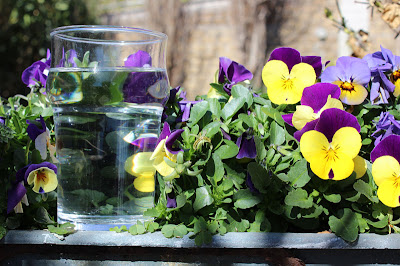I’m writing this article because I’d like our
English-speaking friends to know that in many Italian towns people are drinking
arsenic, every day. That’s right, because in 128 Italian towns there’s a higher
than normal arsenic concentration in tap water. Italian newspapers talked a lot
about the issue, so if you live in Italy you’ve probably heard about
this. I personally found it out in 2010, when the European Union denied Italy’s derogation
request for arsenic concentrations in drinking water of up to 50 mg/l (which
had been accepted since 2001!!).
In fact, under EU legislation, total arsenic
levels in drinking water should not exceed 10 micrograms per liter. Because
arsenic is known to cause cancer. But
derogations for up to 20 mg/l are still possible.
Out of the 128 Italian towns affected by this
“little problem”, 91 are in the Lazio Region (and Anzio,
where we live, is one of them!), 16
in Tuscany, and the
rest in Campania, Trentino, Lombardia and Umbria. Such high levels
of arsenic in drinking water (which, in some cases peak to 50 mg per liter) are
supposedly due to “natural” causes, such
as groundwater flowing through areas with volcanic rocks and layers of lava.
Last year, the Lazio Region had assured the
situation was under control, and the necessary water treatment and filter
systems were practically ready for use.
But actually, in many towns nothing much has changed since then. Only
two of them have so far installed arsenic water filters. Some mayors have banned
the use of tap water for children under age 3 and pregnant women. (Thereby
allowing everyone else to drink it!) Other have made drinking fountains
available, from which residents can get their supply of still (for free) or
sparkling (5 cents per liter) drinking water. But, in the meantime,
contaminated water keeps flowing from our taps at home.
Moreover,
local health authorities have been carrying out inspections and water sampling
across businesses, such as coffee bars, restaurants and bakeries, and have
imposed upon those businesses whose water samples contain higher than normal arsenic
levels the obligation to install arsenic water filters, which they must pay
for. I mean, if it’s supposed to be okay
for our health to use tap water for cooking, and even drinking if you’re not a
toddler, why is it not okay for businesses to use it? Why should they comply
with the EU rules if the public administration doesn’t in the first place?
Codacons, the Italian consumer protection
association, has already taken action, and Lazio’s regional administrative
court (TAR) ruled that the Italian Ministry of Health and the Environment must pay
a compensation of 200 thousand euros (100 euros per resident) in the areas
where arsenic was found in the water.
Lazio’s
TAR stated that the hazards for human health produced by a prolonged exposition
to arsenic in tap water, even if in very small amounts, are certain, based on
the results of research conducted on over 11,700 people in Bangladesh,
which were published in The Lancet online scientific journal. Such research demonstrated
that high arsenic levels in blood significantly increase the risk of cancer. Moreover,
according to estimates by WHO, which has referred to
the situation in Bangladesh
as "the largest mass poisoning of a population in history", at
least 35 million people have drunk contaminated water in Bangladesh
since the 70s. According to the Heals study
(Health Effects of Arsenic Longitudinal Study), coordinated by Prof. Habibul
Ahsan from the University of Chicago, an estimated 21% of
deaths from all causes and 24% of deaths linked to chronic diseases (mainly liver, bladder and skin cancer and heart
diseases) could be attributed to drinking arsenic-contaminated
well water at concentrations greater than 10µg/L.
(for
further information: http://www.eurekalert.org/pub_releases/2010-06/l-rod061710.php. )
Codacons, however, is not going to stop: they’re
promoting another class action, requesting that a compensation of 1500 euros be
paid for each person participating in this action, as well as lower water fees
in the towns where there is contaminated tap water. Anyone can participate in
this class action, but make up your mind soon, because you have to register by
February 29 (for further information, check out their website: http://www.codacons.it).
Benedetta Ferri _ GOSer



